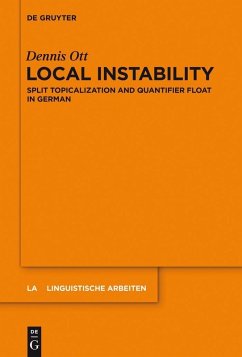This monograph argues for a novel approach to split topicalization and quantifier float in German, based on the premise that syntactic structure-building proceeds solely via free application of Merge. Following recent developments in the pursuit of a more principled theory of syntax, it is argued that the stipulative notion of 'projection' ought to be dispensed with: syntactic objects created by Merge are not headed, and endocentricity arises due to a simple search algorithm. When this algorithm fails, specifically in symmetric {XP,YP} structures, an unlabeled constituent results; where a label is required, such structures are locally unstable. It is argued that both split topics and floated quantifiers are the result of this kind of local instability: when an exocentric predication structure is merged in argument or adjunct position, XP must be displaced at the phase level to allow for determination of a label. It is this symmetry-breaking movement that yields the 'split constituent' in surface form. Based on careful empirical scrutiny of two recalcitrant problems for syntactic theory, the present work adduces substantial support for a 'minimalist' grammatical architecture devoid of phrase-structural residue.
Dieser Download kann aus rechtlichen Gründen nur mit Rechnungsadresse in A, B, BG, CY, CZ, D, DK, EW, E, FIN, F, GR, HR, H, IRL, I, LT, L, LR, M, NL, PL, P, R, S, SLO, SK ausgeliefert werden.

